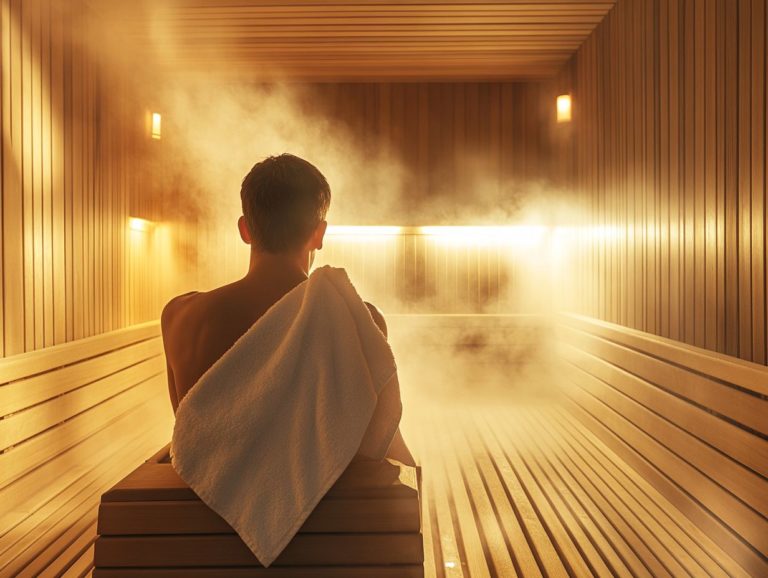5 Benefits of Using a Sauna After Exercise
Have you ever thought about slipping into a sauna after your workout? This time-honored practice comes with a wealth of benefits that can truly elevate your post-exercise routine.
From aiding muscle recovery to boosting blood circulation, saunas promote relaxation and enhance your skin s health. They can be a transformative element in your wellness journey, especially for fitness enthusiasts.
Get ready to discover five amazing reasons to dive into the warmth of a sauna! You’ll also learn how saunas work, the different types available, and essential safety tips.
Prepare to discover how just a few minutes in a sauna can enhance your fitness experience and recovery time in remarkable ways!
Contents
- Key Takeaways:
- 1. Helps with Muscle Recovery
- 2. Increases Blood Circulation
- 3. Promotes Relaxation and Reduces Stress
- 4. Can Aid in Weight Loss
- 5. May Improve Skin Health
- What Is a Sauna and How Does It Work?
- Frequently Asked Questions
- What are the benefits of using a sauna after exercise?
- How soon should I use a sauna after exercising?
- Can using a sauna after exercise help with weight loss?
- Are there any risks associated with using a sauna after exercise?
- How often should I use a sauna after exercise?
- Are there any other benefits of using a sauna after exercise?
Key Takeaways:

- Using a sauna after exercise can help with muscle recovery, reducing soreness and improving overall performance.
- Increased blood circulation from sauna use can aid in flushing out toxins and delivering important nutrients to muscles.
- Relaxing in a sauna promotes stress reduction and improves mental well-being after a strenuous workout.
1. Helps with Muscle Recovery
Saunas, whether you prefer the traditional dry heat or the modern infrared variety, offer remarkable muscle recovery benefits for athletes and fitness enthusiasts alike.
They provide a natural way to relieve muscle tension and soreness after intense workouts.
Sauna heat increases blood flow and nutrient delivery. This supports your muscles’ recovery and helps boost growth hormones.
Increased circulation nourishes fatigued muscle tissues and helps eliminate metabolic waste that can impede recovery. Research published in the Journal of Athletic Training reveals that regular sauna use can significantly reduce delayed onset muscle soreness (DOMS), which refers to the pain and stiffness you often feel after exercising. Furthermore, how saunas enhance overall well-being underscores the many benefits of incorporating this practice into your routine.
The American Council on Exercise highlights that sauna temperatures effectively reduce inflammation and provide pain relief, ultimately speeding up recovery times. By promoting relaxation and lowering stress hormones, saunas offer a holistic recovery experience that enhances your performance, whether on the field or in the gym. Additionally, exploring the benefits of regular sauna use during winter can further support your health and wellness goals.
2. Increases Blood Circulation
Regular sauna use significantly boosts your blood circulation, leading to improved cardiovascular health and an elevated heart rate.
This is crucial for anyone looking to optimize workout routines and achieve fitness goals.
During your sauna sessions, heat exposure causes your blood vessels to dilate, allowing for increased oxygen delivery to your muscles. This is vital for both recovery and performance enhancement.
This process helps eliminate metabolic waste and promotes nutrient delivery, essential for muscle repair.
Research published in the International Journal of Sports Medicine highlights these physiological changes. Those who use saunas regularly often enjoy lower blood pressure and improved endothelial function, further boosting cardiovascular benefits.
Experts suggest adding sauna sessions to your routine for better results, enhancing overall athletic performance in both endurance and strength activities.
3. Promotes Relaxation and Reduces Stress
Sauna sessions offer more than just physical health benefits; they are a powerful way to relax and reduce stress. This significantly enhances your mental health and overall well-being as an athlete. Using relaxation techniques like deep breathing helps your recovery.
In these serene moments, you can explore various relaxation techniques, such as visualization or mindfulness meditation. By immersing yourself in the warm embrace of the sauna, you create a sanctuary to unwind and release the tension built up from daily stresses or intense training.
Embracing proper sauna etiquette like keeping conversations quiet, respecting personal space, and prioritizing cleanliness enriches this tranquil atmosphere. This mutual respect fosters an environment where everyone can soak in the calming ambiance, enhancing the psychological benefits of regular sauna use, including the ways saunas improve mental health.
4. Can Aid in Weight Loss

Using a sauna can significantly help your weight loss journey by promoting sweating and aiding your body’s process of removing toxins. This ultimately boosts your cardiovascular health and energy levels during and after workouts.
As you spend time in the sauna, your core temperature rises, increasing both your heart rate and metabolic rate. This response mimics the benefits of moderate exercise and enhances your ability to burn additional calories. To learn more about the advantages of saunas, check out the 5 surprising benefits of far infrared saunas.
Studies suggest that using a sauna regularly can help burn fat and improve how your body responds to insulin. While it’s essential to complement sauna sessions with a balanced diet and a consistent exercise routine for the best results, the benefits of sauna sessions for stress relief can also help reduce recovery time post-workout, making it a valuable addition to your fitness regimen.
5. May Improve Skin Health
Regular sauna use can greatly enhance your skin health. The act of sweating helps remove impurities and toxins that can clog your pores, contributing to clearer and healthier skin.
When you sweat, you flush out harmful substances, resulting in a more vibrant appearance. The increased blood circulation during your sauna sessions boosts that youthful glow, improving your skin s vitality.
To maximize these benefits, stay properly hydrated, as sweating can deplete your body’s moisture levels. Drink water before and after your sauna sessions, and use hydrating products afterward to ensure your skin remains plump and radiant. Additionally, exploring the top health benefits of sauna safety compliance can enhance your overall experience. Incorporate foods rich in water content, like fruits and vegetables, to support your skin’s hydration from within.
What Is a Sauna and How Does It Work?
A sauna is not just a heated room; it s a sanctuary for relaxation and wellness. By exposing yourself to heat, you raise your body temperature, discovering amazing health benefits like detoxification, muscle recovery, and improved cardiovascular health. You can choose from various sauna types, such as infrared saunas, dry saunas, and steam rooms, each offering unique advantages tailored to your needs.
These rooms create a carefully controlled environment where elevated temperatures enhance blood circulation and stimulate metabolic processes, facilitating better detoxification. For example, infrared saunas use electromagnetic radiation to warm your body directly, making them exceptional for deep tissue penetration. Traditional dry saunas raise the ambient temperature using heated stones or wood, while steam rooms provide a soothing, moist atmosphere through steam generated from boiling water, perfect for alleviating respiratory issues.
Each type of sauna caters to different preferences and health requirements, ultimately offering an enriching experience that enhances your overall well-being, including benefits for mental health.
What Are the Different Types of Saunas?
You ll find a variety of saunas to explore, each offering a distinct experience and health benefits tailored to your preferences. Traditional dry saunas generate high heat typically between 150 F and 195 F with low humidity levels. This combination encourages deep sweating, which can be excellent for detoxification and muscle recovery.
In contrast, infrared saunas utilize infrared heaters to warm your body directly at lower temperatures, usually around 120 F to 140 F. This option is often more tolerable, yet it still promotes relaxation and can alleviate pain, making it an excellent choice for athletes.
Then there are steam rooms, characterized by their high humidity and lower heat. These create a moist environment that can benefit respiratory health and enhance skin hydration.
As you indulge in any sauna experience, remember to stay hydrated and embrace the tranquility. This way, you can fully appreciate the serenity and health benefits of sauna sessions in your chosen haven.
How Long Should One Stay in a Sauna After Exercise?

The ideal duration for your sauna session after exercise typically falls between 15 to 20 minutes. Make sure to listen to your body and stay hydrated throughout your time in the sauna to enhance your recovery!
Your individual tolerance levels will vary based on factors such as your fitness level, age, and overall health. Some may feel revitalized after just a few minutes, while others might find that extending their session allows them to fully enjoy the relaxation benefits and improve their mental health.
Keep track of how you re feeling in the sauna. Your comfort is key! If you push too hard, you risk overheating or feeling dizzy. Pay attention to any signs of discomfort dizziness, nausea, or excessive sweating are indicators to take seriously. If you experience these, it s wise to exit the sauna without hesitation.
Having a water bottle within reach can help you maintain proper hydration, vital for your recovery process, especially during post-workout sessions.
What Precautions Should Be Taken When Using a Sauna?
Stepping into a sauna? Prioritize your safety! Stay hydrated, and know your health conditions that might affect your experience. The heat can induce sweating and lead to dehydration, or loss of fluids that can make you feel tired or dizzy. This can be particularly harmful if you have certain medical concerns, such as heart disease or diabetes.
It’s essential to pay attention to signs of discomfort, heat stress, or any unusual sensations while using the sauna. If you experience nausea or dizziness, exit the sauna immediately. Health organizations suggest limiting sauna sessions to 15 to 20 minutes to avoid overheating.
Can Everyone Use a Sauna After Exercise?
While you may find sauna sessions to be a delightful addition to your post-exercise routine, they might not be suitable for everyone, especially those with certain health conditions or concerns related to heart health.
If you have heart disease or are managing diabetes, approach sauna use with caution. The elevated temperatures can place extra stress on your heart, potentially exacerbating existing conditions or leading to complications. Individuals with diabetes face heightened risks of dehydration, which can affect blood sugar levels and overall energy levels.
Before you integrate sauna sessions into your routine, consult with healthcare professionals. They can offer personalized guidance based on your health history, ensuring that sauna use aligns with your fitness goals and supports muscle recovery. Additionally, you may want to explore the psychological benefits of sauna use to enhance your overall wellness while prioritizing your safety.
Are There Any Potential Risks or Side Effects of Using a Sauna After Exercise?
Using a sauna after your workout can come with its own set of risks and side effects, such as dehydration and elevated body temperature. Make sure to stay hydrated for a fantastic sauna experience! Be aware of how your body responds to heat exposure, especially regarding heart health.
You may also experience dizziness and skin irritation from extended heat exposure, particularly if you have conditions like eczema or psoriasis. Recognizing the signs of overheating, like lightheadedness or discomfort, is crucial. If you experience these symptoms, exit the sauna immediately.
By practicing mindful sauna habits like limiting your session times and incorporating cooling breaks, you can significantly mitigate these risks. Staying well-hydrated before and after your sauna use enhances your experience and amplifies the sauna benefits, creating a safer and more enjoyable space for relaxation and recovery, while also promoting muscle growth.
Frequently Asked Questions

What are the benefits of using a sauna after exercise?
- Improved muscle recovery: Using a sauna after exercise can help relax and loosen muscles, reducing soreness and promoting faster recovery time.
- Increased blood flow: The heat from a sauna can improve circulation, delivering more oxygen and nutrients to your muscles for better recovery.
- Detoxification: Sweating in a sauna can help remove toxins from your body, promoting overall health and well-being, and supporting the process of removing harmful substances from your body.
- Stress relief: Saunas have a calming effect on the body, reducing stress and promoting relaxation techniques after a tough workout.
- Enhanced immune system: Regular use of saunas has been linked to improved immune function, helping to fight off illness and keep you healthy, while contributing to muscle growth.
How soon should I use a sauna after exercising?
It is recommended to wait at least 5-10 minutes after exercising to allow your heart rate and core temperature (the normal temperature of your body) to decrease to a safe level, ensuring you are ready for sauna use.
Can using a sauna after exercise help with weight loss?
While using a sauna may cause temporary water weight loss, it is not an effective method for long-term weight loss. However, the detoxifying effects of a sauna may contribute to overall health and weight management.
Are there any risks associated with using a sauna after exercise?
It is important to stay hydrated and not spend too much time in a sauna, as it can lead to dehydration and overheating, especially if you have heart disease or are managing diabetes. If you have any health conditions, it is best to consult with a doctor before using a sauna after exercise.
How often should I use a sauna after exercise?
Generally, it is safe to use a sauna after exercise 1-2 times a week for fitness goals. However, listen to your body and adjust the frequency accordingly. If you feel any discomfort or dizziness, it’s best to take a break and consult with a doctor.
Are there any other benefits of using a sauna after exercise?
In addition to the physical benefits, using a sauna after exercise can also provide mental relaxation, improved sleep, and increased feelings of well-being, enhancing your overall mental health.
Ready to experience the benefits of sauna use after your next workout? Give it a try!






